
Who’s ready for some impact wrench action? We spent several days testing the best cordless impact wrenches and today, I’m isolating two top brands for a 1 v 1 feature. In this Milwaukee vs DeWalt impact wrench review, I’m going to walk you through the basics of two mid-torque models and share what we discovered in our testing.
Milwaukee M18 Fuel Mid-Torque Impact Wrench 2962
For Milwaukee, we’re considering the M18 Fuel 2962. When it launched a few years back, this impact wrench seemed impossibly compact considering how much power it has. Its size was closer to a compact model than competing mid-torques on the market. Milwaukee’s competition has responded somewhat, but this is still the most compact mid-torque impact wrench available.
DeWalt 20V Max XR Brushless Mid-Range Impact Wrench DCF891
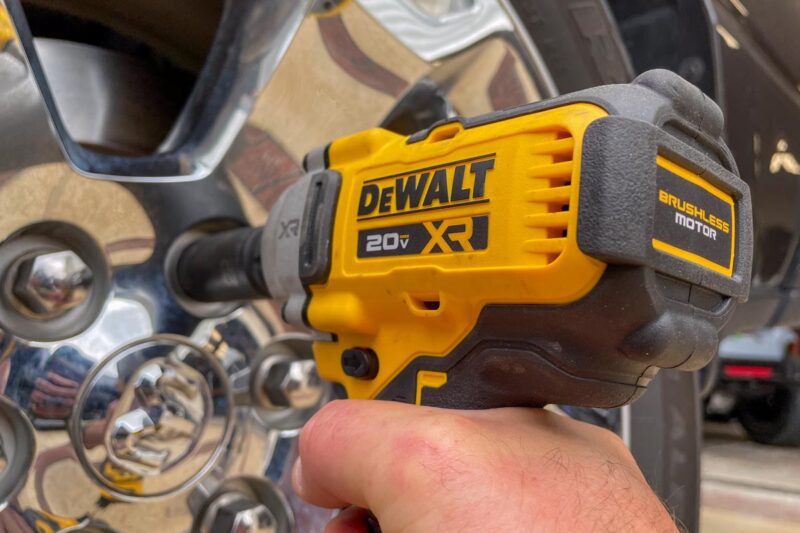
For DeWalt, it’s the 20V Max XR Brushless DCF891. Newer than Milwaukee’s entry in this competition, DeWalt took a big step forward in performance and vaulted back into competition in the professional class.
Milwaukee vs DeWalt Impact Wrench Key Specifications
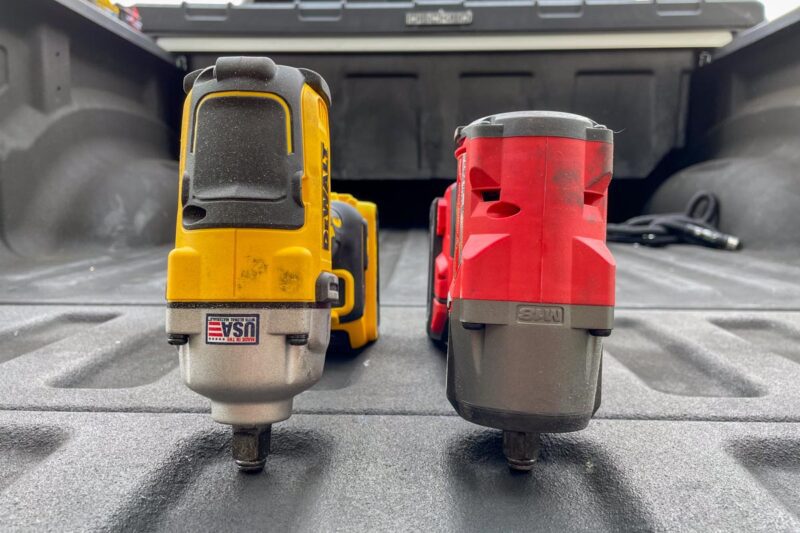
Before we jump into our test results, let’s start with some specifications. On paper, it’s clear Milwaukee is the more compact tool with a faster top speed. However, DeWalt appears to have a nice advantage in torque. We’ll see if reality confirms that in a moment.
| Milwaukee 2962 | DeWalt DCF891 | |
| Speeds | 0 – 1250/1950/2575 RPM | 0 – 600/1200/2000 RPM |
| Max Impact Rate | 3100 IPM | 3100 IPM |
| Max Forward Torque | 550 ft-lbs | 600 ft-lbs |
| Max Breakaway Torque | 650 ft-lbs | 800 ft-lbs |
| Drive | 1/2-inch friction ring | 1/2-inch friction ring |
| Head Length | 6.0 in | 7.0 in |
| Bare Weight | 3.6 lbs | 3.8 lbs |
| Weight w/5.0Ah Battery | 5.2 lbs | 5.3 lbs |
Milwaukee vs DeWalt Impact Wrench Test Results
We ran three tests to get an idea of the performance you can expect from these impact wrenches. Before each test, we fully charged the battery we use.
Bolt Breaking Test
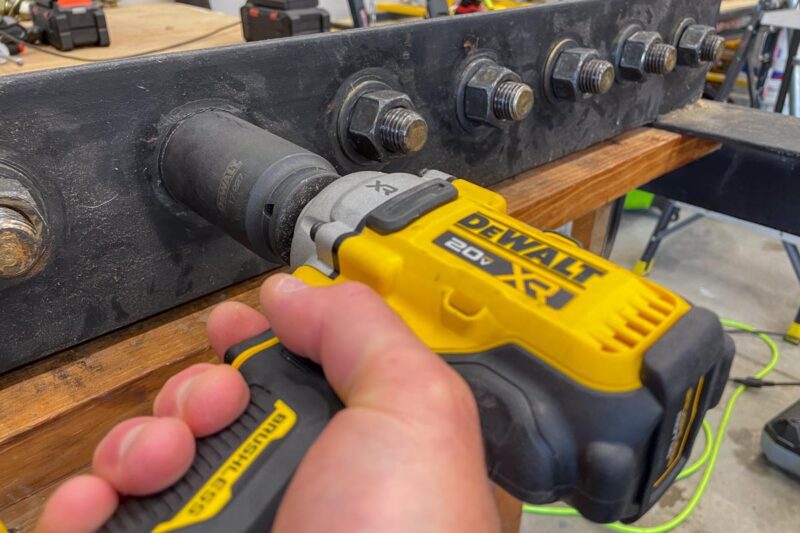
For mid-torque impact wrenches, we set our bolt break rig to 500 pounds. Each model breaks all 8 bolts and we time how long each one takes. The final results are an average of the 5 most consistent breaking times.
| Milwaukee 2962 | DeWalt DCF891 | |
| Average Breaking Speed | 2.63 seconds | 0.64 seconds |
In this test, DeWalt had a clear advantage, owing to its higher torque. Milwaukee’s performance wasn’t a struggle by any stretch of the imagination, but DeWalt showed the advantage of having 200 ft-lbs more breakaway torque.
Inertia Torque Test
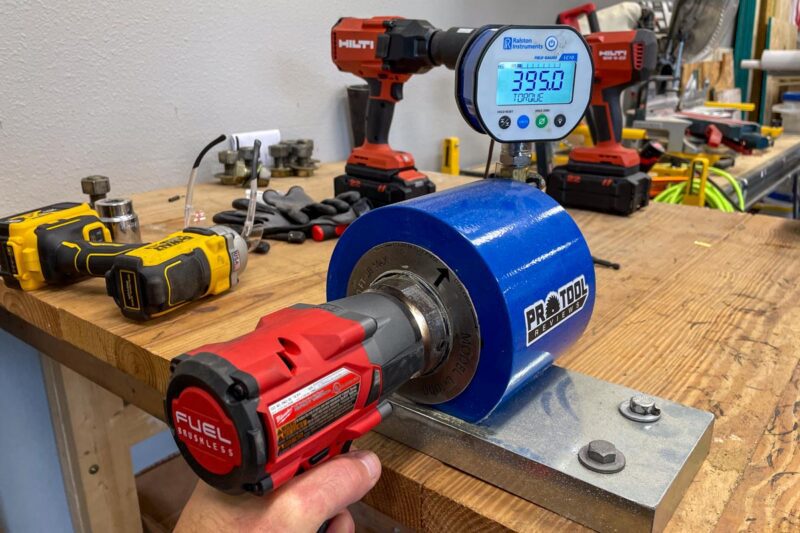
Inertia Torque’s L-1000 torque tester is capable of repeatably measuring impact torque up to 1000 ft-lbs. While the results are lower than what manufacturers report in the specs, the repeatability of the results gives us confidence in being able to use it as a benchmark test for comparative purposes.
With the impact wrench in its highest performing, non-assisted mode, we engage the tool at full power for 5 seconds, rest 3 seconds, engage for 5 seconds, rest 3 seconds, and engage again for 5 seconds.
| Milwaukee 2962 | DeWalt DCF891 | |
| Maximum Measured Torque | 336.2 ft-lbs | 382.8 ft-lbs |
Given the torque specs, this result is no surprise. However, when you look at the results proportionally compared to the specifications, Milwaukee closed the gap slightly.
Lag Bolt Test
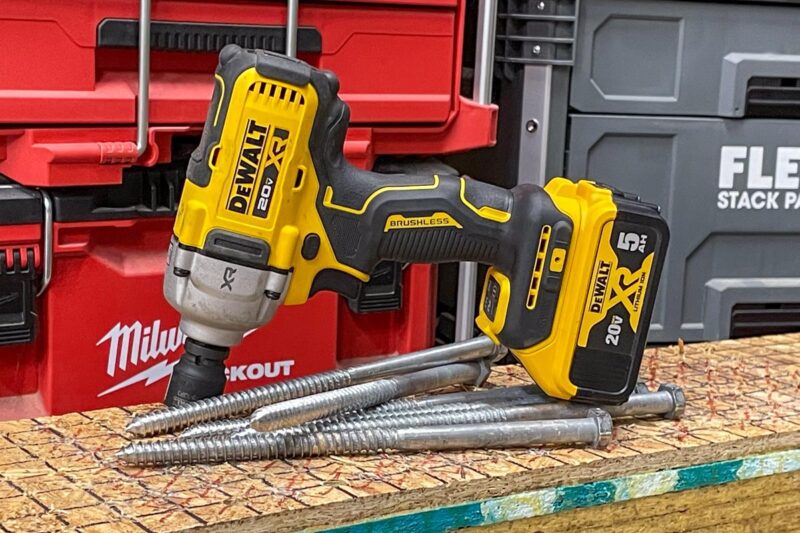
For our lag screw test, we sank 1/2-inch x 10-inch lags into stacked and glued OSB subfloor. Each starting point has a 2-inch pilot hole to help the lag get started. Each impact wrench has a maximum of 30 seconds to sink the screw. The result is the average of three tests based on how proud the lag was after 30 seconds. A lower number indicates a better result.
| Milwaukee 2962 | DeWalt DCF891 | |
| Average Result | 2.38 inches | 0.00 inches |
This is a tough test, even for tools as powerful as Milwaukee and DeWalt’s mid-torque impact wrenches. Again, DeWalt’s power advantage showed, sinking our lag screws while Milwaukee still had some work to do after 30 seconds. Interestingly, DeWalt was the only mid-torque impact wrench we tested to sink the lags using a standard battery.
Testing with Upgraded Battery Packs
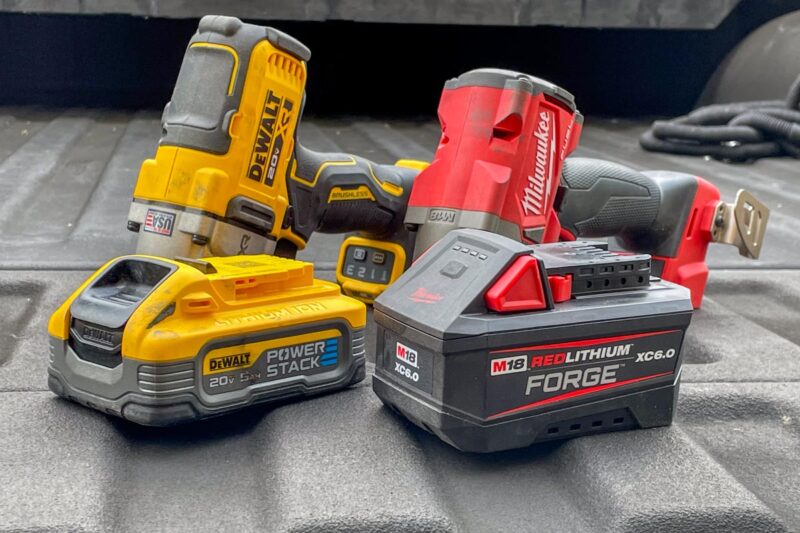
In addition to running our tests with the batteries that commonly come with each tool, we also tested with available upgraded packs to get an idea of the top performance potential.
| Milwaukee 2962 w/6.0Ah Forge |
DeWalt DCF891 w/5.0Ah PowerStack |
|
| Bolt Break | 0.63 seconds | 0.55 seconds |
| Inertia Torque | 398.1 ft-lbs | 407.3 ft-lbs |
| Lag Screw | 0.00 inches | 0.00 inches |
With the PowerStack battery, DeWalt showed improvement across all three tests.
However, the “wow” moment came from Milwaukee, essentially erasing all of DeWalt advantages by only changing out the battery for an M18 Forge pack. While DeWalt still held the advantage across the board, the gap was statistically very small.
Milwaukee vs DeWalt Impact Wrench Feature Highlights
In addition to the basic specifications and our test results, key features can also be a deciding factor when you’re choosing between impact wrenches.
Milwaukee M18 Fuel 2962
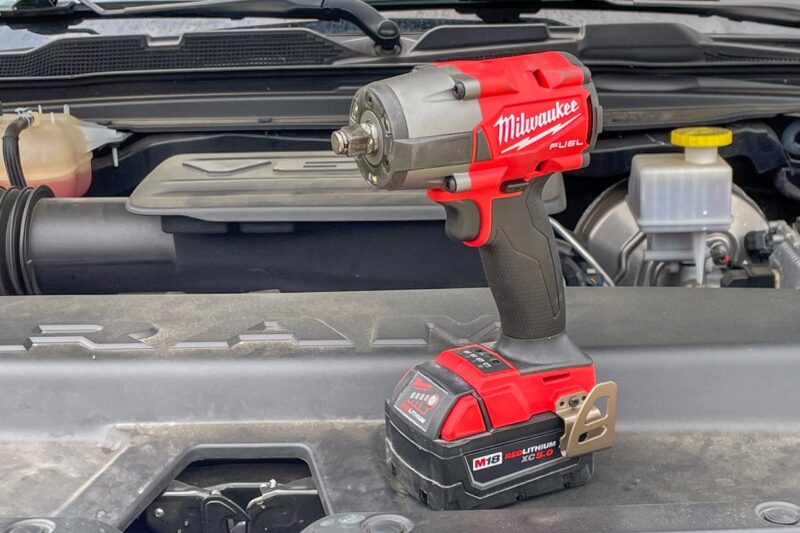
- Brushless motor
- Auto Shut-Off mode (35 ft-lbs max fastening)
- Bolt Removal mode (breaks bolts at full power and then slows RPMs down)
- Tri-LED lights surrounding the drive
- Rated for use in electrical environments up to 69kV
- Available tether kit (49-16-2962)
- Also available with a pin detent drive (2962P)
DeWalt 20V Max XR Brushless DCF891
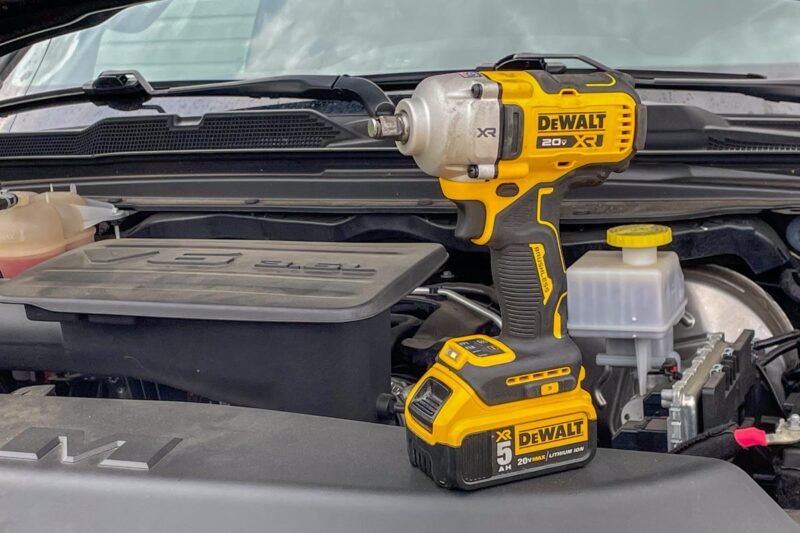
- Brushless motor
- Precision Wrench Control in forward (prevents overtightening)
- Precision Wrench Control in reverse (breaks bolts at full power and slows RPMs down)
- LED light controls
- Also available with a pin detent drive (DCF892)
Milwaukee vs DeWalt Impact Wrench Price
Finally, let’s take a look at the pricing structures for these tools. When available, we consider the bare tool, kit, and common combo prices.
| Milwaukee 2962 | DeWalt DCF891 | |
| Bare Tool | $249 | $249 |
| Kit Price | No standard battery kit | $429 (2 x 5.0Ah batteries) |
| Kit Price | $479 (2 x 5.0Ah oil-resistant batteries) | $479 (2 x 5Ah oil-resistant batteries) |
| Warranty | 5 years | 3 years |
With pricing nearly identical, the only real difference in price is that Milwaukee doesn’t have a standard battery kit for the 2962. Milwaukee’s longer warranty may swing the decision, though.






